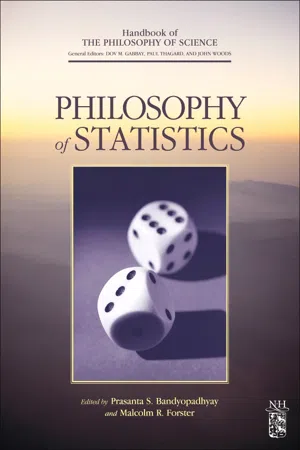
- 1,260 pages
- English
- ePUB (mobile friendly)
- Available on iOS & Android
Philosophy of Statistics
About this book
Statisticians and philosophers of science have many common interests but restricted communication with each other. This volume aims to remedy these shortcomings. It provides state-of-the-art research in the area of philosophy of statistics by encouraging numerous experts to communicate with one another without feeling "restricted by their disciplines or thinking "piecemeal in their treatment of issues.A second goal of this book is to present work in the field without bias toward any particular statistical paradigm.Broadly speaking, the essays in this Handbook are concerned with problems of induction, statistics and probability. For centuries, foundational problems like induction have been among philosophers' favorite topics; recently, however, non-philosophers have increasingly taken a keen interest in these issues. This volume accordingly contains papers by both philosophers and non-philosophers, including scholars from nine academic disciplines.- Provides a bridge between philosophy and current scientific findings- Covers theory and applications- Encourages multi-disciplinary dialogue
Frequently asked questions
- Essential is ideal for learners and professionals who enjoy exploring a wide range of subjects. Access the Essential Library with 800,000+ trusted titles and best-sellers across business, personal growth, and the humanities. Includes unlimited reading time and Standard Read Aloud voice.
- Complete: Perfect for advanced learners and researchers needing full, unrestricted access. Unlock 1.4M+ books across hundreds of subjects, including academic and specialized titles. The Complete Plan also includes advanced features like Premium Read Aloud and Research Assistant.
Please note we cannot support devices running on iOS 13 and Android 7 or earlier. Learn more about using the app.
Information
Table of contents
- Cover Image
- Table of Contents
- Front matter
- Copyright
- Dedication
- General Preface
- Preface
- Contributors
- Philosophy of Statistics
- Elementary Probability and Statistics
- Conditional Probability
- The Varieties of Conditional Probability
- Error Statistics
- Significance Testing
- The Bayesian Decision-Theoretic Approach to Statistics
- Modern Bayesian Inference
- Evidential Probability and Objective Bayesian Epistemology
- Confirmation Theory
- Challenges to Bayesian Confirmation Theory
- Bayesianism as a Pure Logic of Inference
- Bayesian Inductive Logic, Verisimilitude, and Statistics
- Likelihood and its Evidential Framework
- Evidence, Evidence Functions, and Error Probabilities
- Aic Scores as Evidence
- The Likelihood Principle
- AIC, BIC and Recent Advances in Model Selection
- Posterior Model Probabilities
- Defining Randomness
- Mathematical Foundations of Randomness
- Paradoxes of Probability
- Statistical Paradoxes
- Statistics as Inductive Inference
- Common Cause In Causal Inference
- The Logic and Philosophy of Causal Inference
- Statistical Learning Theory as a Framework for the Philosophy of Induction
- Testability and Statistical Learning Theory
- Luckiness and Regret in Minimum Description Length Inference
- MML, Hybrid Bayesian Network Graphical Models, Statistical Consistency, Invariance and Uniqueness
- Simplicity, Truth, and Probability
- Normal Approximations
- Stein's Phenomenon
- Data, Data, Everywhere
- An Application of Statistics in Climate Change
- The Subjective and the Objective
- Probability in Ancient India
- Index